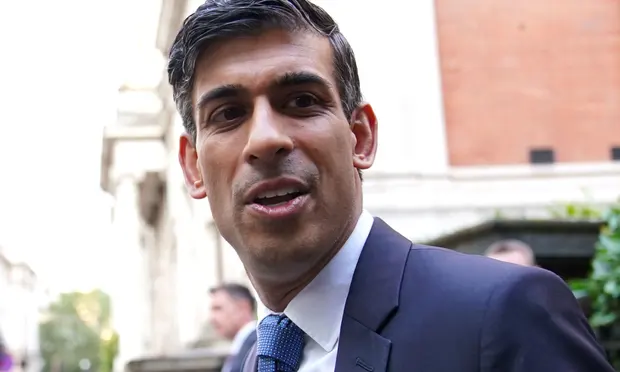Rishi Sunak is under mounting pressure from Conservative MPs to boost the UK’s struggling economy after the Bank of England signalled that there will be no respite from the high interest rates hitting households and businesses until well into next year.
Threadneedle Street prompted calls for tax cuts and a package of support for the housing market after it raised rates for a 14th time in a row, with the cumulative impact of dearer borrowing meaning a general election expected in late 2024 would take place against a backdrop of a barely growing economy.
The Bank announced a quarter-point increase in interest rates to 5.25% and gave a strong hint that further rises would be needed to combat inflation.
In a tough message that came as a further blow to households struggling with the highest interest rates in 15 years, the Bank said policy would need to remain “restrictive enough for long enough” to bring inflation – currently 7.9% – back sustainably to its 2% official target.
Financial markets are now assuming there will be at least one further quarter-point increase in interest rates in the coming months, and that the Bank will then leave them unchanged until late 2024 and bring them down slowly through 2025.
Sir John Redwood, a Conservative MP and former cabinet minister, argued that “targeted tax cuts would be extremely helpful” from the Treasury but said his main criticisms were directed at the Bank for lurching from low interest rates creating inflation to rates that “cause a housebuilding collapse and manufacturing recession”.
The Bank has raised rates sharply from their record low since December 2021 as it tries to crush stubbornly high inflation that has left the UK an outlier among developed economies. With one thinktank predicting that the price for taming inflation will be an extra 350,000 people on Britain’s dole queues, Tory MPs are growing increasingly anxious about the state of the economy.
Downing Street has not denied that people around Sunak have discussed getting rid of the chancellor, Jeremy Hunt, with sources refusing to discuss any “reshuffle speculation”. The prime minister is currently in California, on holiday with his family.
Hunt was not Sunak’s first choice as chancellor as he is regarded as more centrist in his outlook than the prime minister. However, senior Conservative backbenchers appear to be more concerned at the operation of the Bank of England than Hunt’s performance, with some MPs worrying that moving the chancellor could give an impression of Liz Truss-era chaos rather than control.
Speaking on Sky News, Hunt defended his record and made clear that he thought a change at No 11 would be a mistake. “The plan is working, but what we have to do as a government is that we stick to that plan, we don’t veer around like a shopping trolley.”
The shadow chancellor, Rachel Reeves, said higher borrowing costs would be “incredibly worrying for households across Britain already struggling to make ends meet”.
“The Tory mortgage bombshell is hitting families hard, with a typical mortgage holder now paying an extra £220 a month when they go to remortgage,” she said. The interest rate on the average two-year fixed-rate mortgage is 6.85%, according to the data provider Moneyfacts, up from 5.34% in mid-May but below its highs in July.
The Bank’s nine-strong monetary policy committee (MPC) was split three ways on Thursday’s rate decision. Two members voted to increase rates by a sharper 0.5% after a succession of forecasts that had “under-predicted” inflationary pressures and the possibility that the latest outlook would repeat the error. Swati Dhingra, meanwhile, voted to keep rates on hold, arguing that the effects of previous interest rate rises had yet to work their way through to household and business finances and should be allowed more time to dampen spending.
Carsten Jung, a senior economist at the left-of-centre thinktank the IPPR, said the Bank was “already overdoing it” and interest rates “might well be more than a percentage point too high now”



